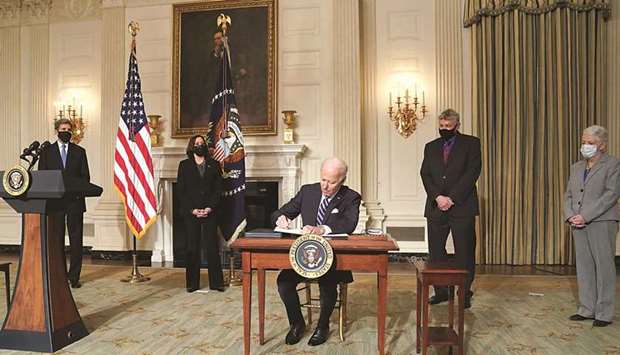President Joe Biden yesterday said the US must lead the global response to the climate crisis, as he signed a raft of orders aimed at curbing rising temperatures and announced a climate summit in April.
“Just like we need a unified national response to Covid-19, we desperately need a unified national response to the climate crisis because there is a climate crisis,” Biden said in remarks delivered at the White House.
“We must lead the global response, because neither challenge can be met, as Secretary (John) Kerry has pointed out many times, by the US alone.”
Biden had made confronting global warming a key pillar of his campaign, and yesterday repeatedly called it an “existential threat” as well as an opportunity for the economy and jobs growth.
“In my view, we’ve already waited too long to deal with this climate crisis. We can’t wait any longer. We see it with our own eyes. We feel it. We know it in our bones. And it’s time to act,” he said.
The US will host a summit on April 22 where it is expected to strengthen its carbon reduction commitments under the Paris agreement, which aims to limit long term warming to 1.5 degrees Celsius.
The other orders include a moratorium on new oil and gas leases on federal and public land, establishing climate considerations as an essential element of US foreign policy and national security.
But Biden said the US would not ban hydraulic fracturing or fracking, which has allowed the country to become the world’s top producer of natural gas and is seen by policy experts as a transition energy, despite its many harmful impacts.
The administration will also revive a presidential council of science advisors, directing agencies to invest in areas with deep economic ties to fossil fuels, and assisting communities disproportionately impacted by environmental harm.
Biden yesterday also reaffirmed Wednesday the United States’ commitment to defend Japan in his first phone call with Prime Minister Yoshihide Suga, striking a note of reassurance after the Trump era.
During Trump’s administration, America’s Asian allies often questioned whether Washington would uphold long-standing promises to defend them in the event of a military attack.
Trump had publicly mulled withdrawing troops from Japan and South Korea, where more than 20,000 US military personnel are stationed to deter any North Korean military action.
Biden and Suga both urged denuclearisation of the whole Korean peninsula in the call — their first since Biden took office last week.
They discussed Washington’s “unwavering commitment to the defence of Japan under Article 5 of our security treaty,” the White House said in a statement, and Biden reaffirmed “his commitment to provide extended deterrence to Japan.”
Suga agreed to visit the US as soon as possible, but the two leaders did not discuss the postponed Tokyo Olympic Games, which could again be threatened by the pandemic, the Jiji Press agency said.
US Secretary of State Antony Blinken also spoke with Japanese Foreign Minister Toshimitsu Motegi yesterday and stressed Biden’s pledge to “engage with the world again,” a state department spokesman said.

US President Joe Biden signs executive orders on tackling climate change as members of his climate team and Vice President Kamala Harris stand behind in the State Dining Room at the White House in Washington, US, yesterday.


